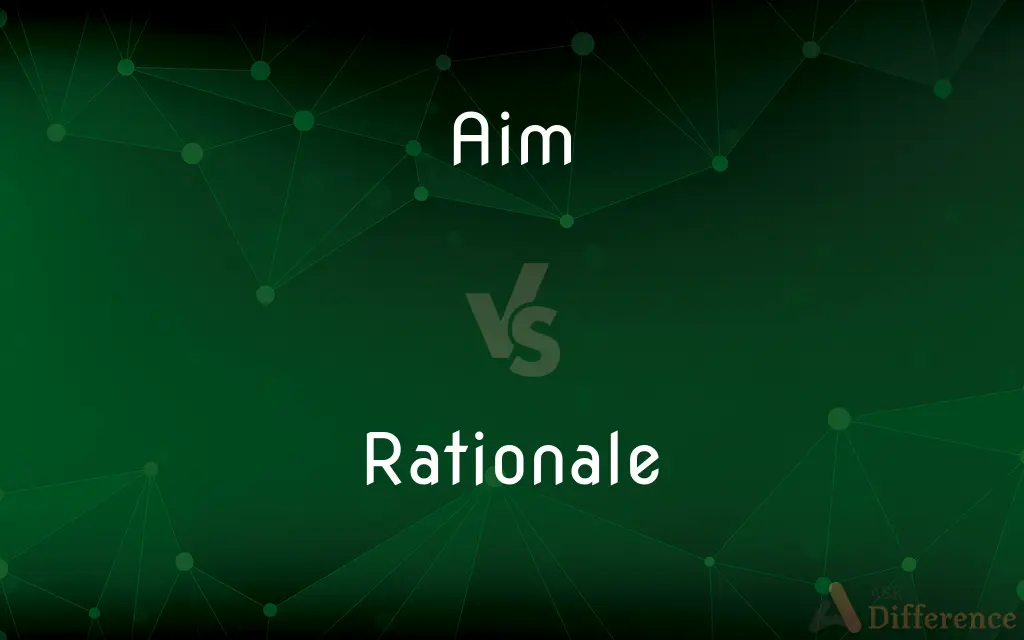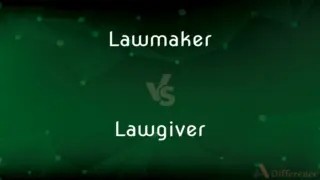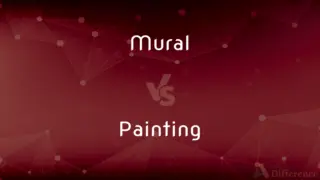Aim vs. Rationale — What's the Difference?
By Tayyaba Rehman & Urooj Arif — Updated on March 12, 2024
Aim is the intended outcome of an action, while rationale explains the reasoning behind the choice.

Difference Between Aim and Rationale
Table of Contents
ADVERTISEMENT
Key Differences
Aim refers to the specific goal or objective that an individual, group, or project seeks to achieve. It is often a clear, concise statement that outlines what is to be accomplished. Rationale, on the other hand, is the justification or reasoning behind a particular action, decision, or strategy. It provides the background explanation for why something is being done.
While aims are typically forward-looking, focusing on what is to be achieved in the future, rationales look backward to explain the reasoning that led to the decision to pursue those aims. Rationale often includes an explanation of how the aim fits into a larger context or strategy, whereas the aim itself is usually more narrow and focused.
Aims are often measurable and can be specific or broad, depending on the scope of the project or decision. Rationales, however, are more qualitative, offering insight into the thought process, considerations, and values that inform the aim. This distinction highlights the complementary nature of aims and rationales in planning and decision-making processes.
In practical application, an aim might be set as part of a project or personal goal, such as "increase sales by 20% within the next fiscal year." The rationale for this aim could involve a variety of reasons, such as taking advantage of market opportunities, responding to competitive pressures, or aligning with a strategic vision for growth.
The formulation of aims and rationales is crucial in various contexts, including academic research, business strategy, and personal development. While an aim provides a clear target for efforts and resources, the rationale ensures that the direction chosen is well-considered, justified, and aligns with broader objectives or principles.
ADVERTISEMENT
Comparison Chart
Definition
The intended outcome or goal of an action or plan.
The reasoning or justification behind a particular action.
Focus
Future-oriented, specifying what is to be accomplished.
Past-oriented, explaining the reasoning for a decision.
Nature
Typically measurable and specific.
Qualitative and explanatory.
Role in Decision-making
Sets the direction or objective to be achieved.
Provides the background and justification for the aim.
Contextual Application
Used in planning to define goals.
Used to explain and support the choice of goals.
Compare with Definitions
Aim
An ambition or desired outcome.
Her aim is to become a doctor.
Rationale
Justification for a belief or action.
The rationale behind the strategy was well-explained.
Aim
A specific objective or target to be achieved.
The aim of the project is to reduce energy consumption by 10%.
Rationale
A set of reasons or a logical basis for a course of action.
He provided a strong rationale for his decision.
Aim
The main intention behind an action.
His aim in writing the book was to share his experience.
Rationale
The reasoning given for a conclusion.
Her rationale for choosing the course was its relevance to her career goals.
Aim
The endpoint to which efforts are directed.
The team's aim was clear: win the championship.
Rationale
The underlying reason or explanation for something.
The rationale for the change was increased efficiency.
Aim
A goal that guides actions.
Their primary aim is to improve customer satisfaction.
Rationale
The thought process leading to a decision.
The project's rationale included environmental considerations.
Aim
Point or direct (a weapon or camera) at a target
Aim for the middle of the target
Aim the camcorder at some suitable object
Rationale
The fundamental reasons for something; the basis
The rationale for dropping the atomic bomb.
Aim
Have the intention of achieving
We aim to give you the best possible service
The programme will aim at deepening understanding
Rationale
An explanation of the basis or fundamental reasons for something.en
Aim
A purpose or intention; a desired outcome
Our primary aim is to achieve financial discipline
Rationale
A justification or rationalization for something.
Aim
The directing of a weapon or missile at a target
His aim was perfect
Rationale
A liturgical vestment worn by some Christian bishops of various denominations.
Aim
To direct (a weapon or camera) toward a point.
Rationale
An explanation or exposition of the principles of some opinion, action, hypothesis, phenomenon, or the like; also, the principles themselves.
Aim
To direct or propel (an object, such as a ball) toward a point
Aimed the pass at a wide receiver.
Aimed the shot at the lower right corner of the goal.
Rationale
(law) an explanation of the fundamental reasons (especially an explanation of the working of some device in terms of laws of nature);
The rationale for capital punishment
The principles of internal-combustion engines
Aim
To direct toward or intend for a particular goal or group
The publicity campaign was aimed at improving the eating habits of children.
Aim
To direct a weapon or camera
The sniper aimed carefully.
Aim
To direct or propel an object toward a point
Aimed for the far goalpost.
Aim
To determine a course or direct an effort
Aim for a better education.
Aim
To propose to do something; intend
The historical society is aiming to restore the town hall.
Aim
The act of aiming
Take careful aim.
Aim
The ability to hit a target or intended point
A marksman with extraordinary aim.
Aim
The degree of accuracy of a weapon or of a person aiming a weapon or propelled object
Your aim was way off on that throw.
Aim
A purpose or intention toward which one's efforts are directed
My aim was to try to make him laugh.
Aim
The pointing of a weapon, as a gun, a dart, or an arrow, or object, in the line of direction with the object intended to be struck; the line of fire; the direction of anything, such as a spear, a blow, a discourse, a remark, towards a particular point or object, with a view to strike or affect it.
Take time with the aim of your gun.
To take aim
Aim
The point intended to be hit, or object intended to be attained or affected.
Aim
Intention or goal
My number one aim in life is to make money to make my parents, siblings and kids happy.
Aim
The ability of someone to aim straight; one's faculty for being able to hit a physical target
The police officer has excellent aim, always hitting the bullseye in shooting practice.
Aim
(obsolete) Conjecture; guess.
Aim
(intransitive) To point or direct a missile, or a weapon which propels as missile, towards an object or spot with the intent of hitting it
He aimed at the target, but the arrow flew straight over it.
Aim
(intransitive) To direct the intention or purpose; to attempt the accomplishment of a purpose; to try to gain; to endeavor;—followed by at, or by an infinitive
To aim at a pass
To aim to do well in life
Aim
(transitive) To direct or point (e.g. a weapon), at a particular object; to direct, as a missile, an act, or a proceeding, at, to, or against an object
To aim an arrow at the deer
She aimed a punch at her ex-boyfriend.
Aim
(transitive) To direct (something verbal) towards a certain person, thing, or group
To aim a satirical comment at Communists in general
Aim
To guess or conjecture.
Aim
To point or direct a missile weapon, or a weapon which propels as missile, towards an object or spot with the intent of hitting it; as, to aim at a fox, or at a target.
Aim
To direct the indention or purpose; to attempt the accomplishment of a purpose; to try to gain; to endeavor; - followed by at, or by an infinitive; as, to aim at distinction; to aim to do well.
Aim'st thou at princes?
Aim
To guess or conjecture.
Aim
To direct or point, as a weapon, at a particular object; to direct, as a missile, an act, or a proceeding, at, to, or against an object; as, to aim a musket or an arrow, the fist or a blow (at something); to aim a satire or a reflection (at some person or vice).
Aim
The pointing of a weapon, as a gun, a dart, or an arrow, in the line of direction with the object intended to be struck; the line of fire; the direction of anything, as a spear, a blow, a discourse, a remark, towards a particular point or object, with a view to strike or affect it.
Each at the head leveled his deadly aim.
Aim
The point intended to be hit, or object intended to be attained or affected.
To be the aim of every dangerous shot.
Aim
Intention; purpose; design; scheme.
How oft ambitious aims are crossed!
Aim
Conjecture; guess.
What you would work me to, I have some aim.
Aim
An anticipated outcome that is intended or that guides your planned actions;
His intent was to provide a new translation
Good intentions are not enough
It was created with the conscious aim of answering immediate needs
He made no secret of his designs
Aim
The goal intended to be attained (and which is believed to be attainable);
The sole object of her trip was to see her children
Aim
The action of directing something at an object;
He took aim and fired
Aim
The direction or path along which something moves or along which it lies
Aim
Aim or direct at; as of blows, weapons, or objects such as photographic equipment;
Please don't aim at your little brother!
He trained his gun on the burglar
Don't train your camera on the women
Take a swipe at one's opponent
Aim
Propose or intend;
I aim to arrive at noon
Aim
Move into a desired direction of discourse;
What are you driving at?
Aim
Specifically design a product, event, or activity for a certain public
Aim
Intend (something) to move towards a certain goal;
He aimed his fists towards his opponent's face
Criticism directed at her superior
Direct your anger towards others, not towards yourself
Aim
Direct (a remark) toward an intended goal;
She wanted to aim a pun
Aim
Have an ambitious plan or a lofty goal
Common Curiosities
Why is rationale important?
Rationale explains the reasoning behind decisions, ensuring that actions are thoughtful and justified.
What is the difference between aim and rationale?
Aim is the goal or objective to be achieved, while rationale is the reasoning or justification behind pursuing that goal.
Can rationale change over time?
Yes, as new information or circumstances arise, the rationale for an action or decision can evolve.
Can there be multiple rationales for a single aim?
Yes, there can be multiple reasons or justifications for pursuing a particular aim.
How do rationales influence stakeholder perceptions?
A well-articulated rationale can enhance stakeholder understanding and support for a decision or action.
How do you formulate a good aim?
A good aim is specific, measurable, achievable, relevant, and time-bound (SMART).
Is the rationale always based on facts?
While it should be, the rationale can also include beliefs, values, and assumptions that influence decisions.
How does one communicate their aim and rationale effectively?
Clearly state your aim and support it with a logical and well-explained rationale.
How does one evaluate the effectiveness of an aim?
By assessing whether the specific, measurable objectives have been achieved within the set timeframe.
Can an aim exist without a rationale?
Technically, yes, but having a rationale provides depth and justification for the aim, making it more meaningful and grounded.
In what contexts are aims and rationales most used?
They are widely used in business, academic research, project management, and personal goal setting.
What role does rationale play in decision-making?
It provides the basis for making informed and reasoned decisions.
What happens if the rationale is flawed?
A flawed rationale can lead to misguided aims and strategies, potentially resulting in failure or inefficiency.
Can the aim and rationale be the same?
No, the aim is what you want to achieve, while the rationale is why you want to achieve it.
How do aims and rationales contribute to success?
Together, they provide direction and justification, enhancing focus, motivation, and strategic alignment.
Share Your Discovery

Previous Comparison
Lawmaker vs. Lawgiver
Next Comparison
Mural vs. PaintingAuthor Spotlight
Written by
Tayyaba RehmanTayyaba Rehman is a distinguished writer, currently serving as a primary contributor to askdifference.com. As a researcher in semantics and etymology, Tayyaba's passion for the complexity of languages and their distinctions has found a perfect home on the platform. Tayyaba delves into the intricacies of language, distinguishing between commonly confused words and phrases, thereby providing clarity for readers worldwide.
Co-written by
Urooj ArifUrooj is a skilled content writer at Ask Difference, known for her exceptional ability to simplify complex topics into engaging and informative content. With a passion for research and a flair for clear, concise writing, she consistently delivers articles that resonate with our diverse audience.















































